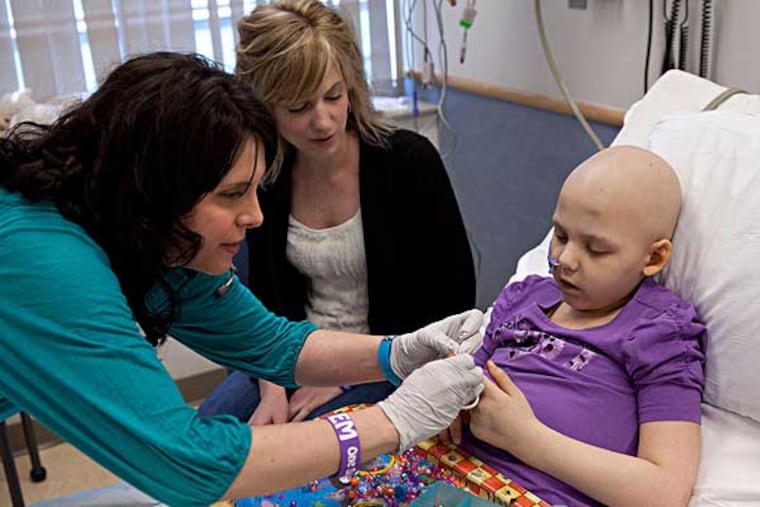Penn study confirms T-cell effectiveness on leukemia
Three years ago, University of Pennsylvania researchers wondered whether their early success with a novel immune therapy was the dawn of a revolution in cancer treatment - or a fluke.

Three years ago, University of Pennsylvania researchers wondered whether their early success with a novel immune therapy was the dawn of a revolution in cancer treatment - or a fluke.
Now they know the answer, and so do other experts in the cautious world of medical science.
Penn and Children's Hospital of Philadelphia on Saturday reported the results from 59 adults and children who received a gene therapy engineered from their own disease-fighting T cells to treat recurrent, intractable leukemia.
In 31 patients - more than half - the leukemia disappeared. The "serial killer" T cells kicked in within two weeks of being infused, eradicating pounds of malignant cells within days. Twenty-six patients remain cancer-free, including two of the first three who were treated in 2010.
"A lot of people get to have hope now," said patient number two, Douglas Olson, 67, of Tinicum, who this year celebrated by running his first half-marathon. "The world has been transformed a little bit, and I was part of it."
Indeed, while Penn was the first to report a breakthrough using the designer T cell approach, Memorial Sloan-Kettering Cancer Center, the National Cancer Institute, and others are now having success with it, and forming collaborations with industry.
The long-held dream of teaching the immune system to fight the body's own renegade cells "is not science fiction anymore," said Seattle oncologist Stephanie J. Lee, an officer of the American Society of Hematology, which sponsored the conference where the latest T cell data were presented.
Novartis, the global pharmaceutical giant that is partnering with Penn and Children's, has set up a New Jersey manufacturing plant to scale up production of the therapy. A clinical study involving multiple medical centers is being planned, with the hope of seeking Food and Drug Administration approval in 2016, said Hervé Hoppenot, president of Novartis Oncology.
"We are seeing what could be a new dimension in the treatment of cancer," he said.
Still, the miracles on 34th Street, where Penn and Children's sit side by side, are also revealing the current limits of the immune-boosting therapy.
It is now clear that the engineered T cells are far more effective against acute lymphoblastic leukemia (ALL), the most common form in children, than against chronic lymphocytic leukemia (CLL), the slower-progressing form that arises in adults.
Of 22 children and five adults with ALL, 89 percent experienced complete remissions - no sign of their advanced, refractory blood cancers. Only seven of the 32 adults with CLL had complete remissions.
"Maybe the ALL cells are better targets," said Penn blood cancer specialist David Porter. "We don't know yet."
It has also become clear that, just as with conventional chemotherapy and radiation, remissions achieved with the T cells are not necessarily cures. Five pediatric patients whose cancer seemed to be eradicated - sensitive technology could not detect a single malignant cell - relapsed after months of robust health.
"We're working very hard in the lab to try to understand why," Children's oncologist Stephan Grupp said.
He knows all about the haunting fear of relapse, having been diagnosed and treated for lymphoma five years ago.
"I worry about it [relapse] every day," he said. "It has changed my perspective. I had an intellectual understanding of what people go through. Now I have a personal understanding."
The T cell treatment is the culmination of 20 years of work led by Penn gene-therapy pioneer Carl June, and it builds on immunology breakthroughs going back to the 1970s.
Unlike chemotherapy and radiation - which poison fast-growing cells, malignant or healthy - the T cells are engineered to recognize and attack cells with a particular identifying marker, or "antigen." The T cells can also engraft and multiply, so their protective effect persists, like a vaccine.
Among the obstacles to this approach has been the difficulty of finding an antigen that is unique to malignant cells. Cancer arises from healthy cells, so most cancer antigens are also found on their premalignant kin.
The Penn therapy does not entirely get around this problem. The T cells zero in on an antigen found on B cells, the blood cells that turn malignant in ALL and CLL. The T cells also kill healthy B cells, but fortunately, the patient can survive without them.
Indeed, if healthy B cells appear, it is a bad sign, because it means the engineered T cells are gone.
"We don't know why some patients lose the T cells and some don't," Porter said. "It doesn't appear to be related to the dosage. Doug [Olson] got the lowest dose we've given anyone, and he's in remission more than three years."
Wonderful years. Besides time with his family - a wife, four children, three grandchildren - his medical diagnostics company is developing a bedside blood-count test that would eliminate the need to send the sample to a lab.
"When I go in for a checkup and I'm cancer-free, I walk through the waiting room, seeing people still fighting," Olson said. "It's impossible not to just feel so thankful. And a little bit of survivor's guilt."